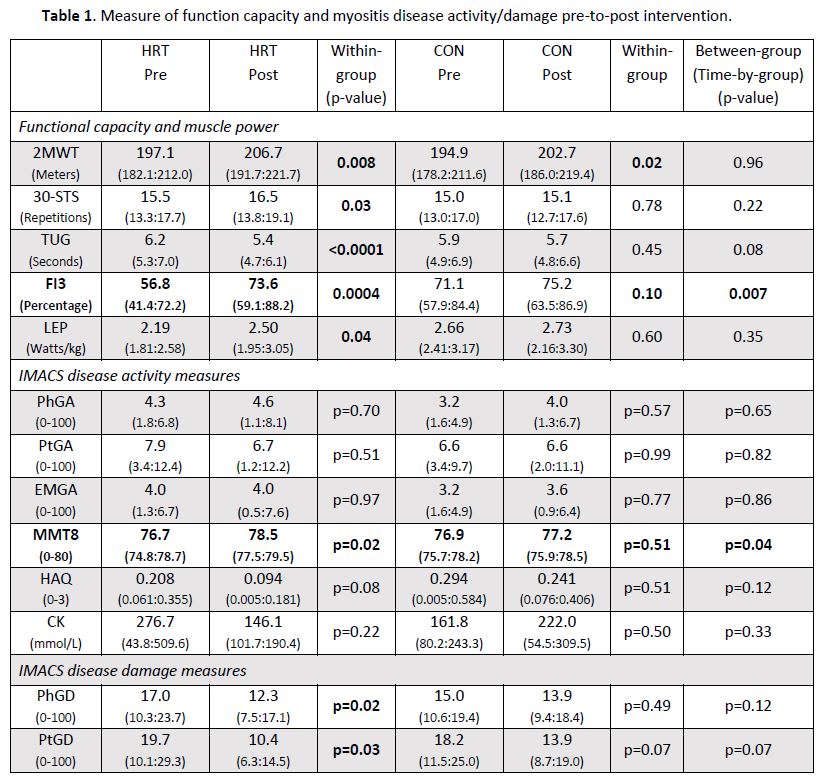Session Information
Date: Wednesday, November 15, 2023
Title: Abstracts: Muscle Biology, Myositis & Myopathies – Basic & Clinical Science II
Session Type: Abstract Session
Session Time: 9:00AM-10:30AM
Background/Purpose: Myositis is associated with muscle impairment, which impacts quality of life. The purpose of this study was to investigate the effects of high-intensity strength training on quality of life, functional capacity, muscle strength and disease-related measures in patients with myositis.
Methods: Using a randomized control trial design (NCT04486261), 32 patients with established and stable myositis, were randomly allocated to 16 weeks of high-intensity strength training (HRT) or 16 weeks of baseline activity levels (CON). The primary outcome was quality of life (Short Form-36, SF-36) – physical component summary (PCS). Secondary outcomes included SF36 – mental component summary (MCS), functional capacity measures (e.g., 2-minute walk test (2MWT), 30-s Sit-To-Stand (30-STS), Timed-Up-&-GO (TUG) and Functional Index 3 (FI3)), maximal leg extensor power (LEP) and disease-related measures (Physician Global Activity (PhGA), Patient Global Activity (PtGA), Extramuscular Global Assessment (EMGA), Creatine Kinase (CK), Health Assessment Questionnaire (HAQ), Physician Global Damage (PhGD), Patient Global Damage (PtGD), and Manual Muscle Testing 8 (MMT8)).
Results: The primary outcome PCS showed an improvement in favour of HRT with a between-group difference of 5.33 (0.61;10.05) (p=0.03). Further, FI3 showed a between-group difference with greater gains of HRT (11.49 (3.37;19.60) (p=0.04)). Within-group increases in other functional capacity measures were observed with HRT (30-s STS, 6.5%, p=0.03; TUG, 12.9%, p< 0.0001; 2MWT, 4.9%, p=0.008; LEP, 14.2%, p=0.04). HRT also resulted in a between-group improvement in MMT8 (1.30 (0.09;2.51) (p=0.04)). Finally, IMACS’s physician global damage decreased by 27.7% (p=0.02), and patient global damage decreased by 47.2% (p=0.03), within the HRT group (Table 1).
Conclusion: Improvement in physical component of quality of life was observed following 16 weeks of strength training in myositis patients. Likewise, improvements in muscle endurance by FI3 and strength by MMT8 were significantly higher in TRAIN compared to CON. No increases in disease activity or damage were observed. These results indicate that high-intensity strength training is well tolerated and positively impacts patients with established myositis.
To cite this abstract in AMA style:
Jensen K, Aagaard P, Suetta C, Nielsen J, Bech R, Schrøder H, Simonsen C, Christensen J, Diederichsen L. High-intensity Resistance Training Improves Quality of Life, Muscle Endurance and Strength in Patients with Myositis [abstract]. Arthritis Rheumatol. 2023; 75 (suppl 9). https://acrabstracts.org/abstract/high-intensity-resistance-training-improves-quality-of-life-muscle-endurance-and-strength-in-patients-with-myositis/. Accessed .« Back to ACR Convergence 2023
ACR Meeting Abstracts - https://acrabstracts.org/abstract/high-intensity-resistance-training-improves-quality-of-life-muscle-endurance-and-strength-in-patients-with-myositis/

